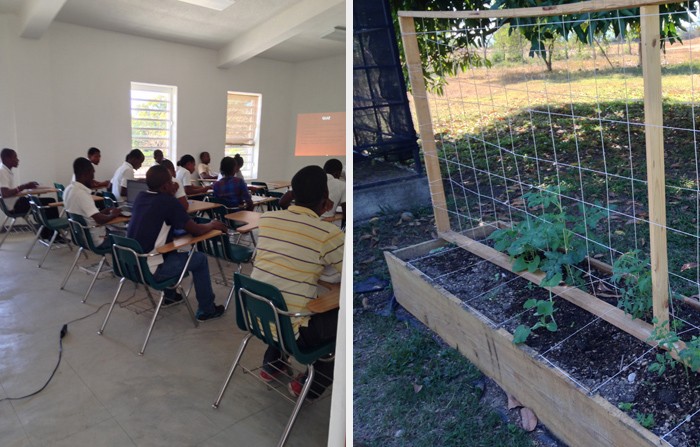During a recent visit to Haiti, USAID officials visited the Zanmi Agrikol (Creole for Partners in Agriculture) school and nutritional supplement manufacturing facility, as well as Mirebalais Hospital, which provides care to the poorest of Haiti with the overarching goal of improving access to health care. Both of these facilities are in the Central Plateau of Haiti, which suffers from the highest rate of malnutrition in the country.

Zanmi Agrikol is the agricultural arm of Zanmi Lasante (Creole for Partners In Health) founded in 2002. Zanmi Lasante also supports the Mirebalais Hospital, working closely with the Ministry of Public Health and Population to whom the hospital will be handed over in the future.
The Zanmi Agrikol manufacturing facility prepares and packages a peanut-based “Ready to Use Therapeutic Food” (RUTF) for families whose children face severe malnutrition. Zanmi Agrikol has become a major producer of peanuts for this nutritional product, known as Nourimanba.
Zanmi Agrikol also has a vocational/education arm known as Centre de Formation Fritz Lafontant (CFFL), which was created to answer the desperate need for continuing education and vocational skills for young people finishing high school in the Central Plateau. The program was developed in the hopes of retaining young men and women, rather than having them travel to Port-au-Prince to continue their studies.
CFFL is also open to local farmers to provide them with education, seedlings, tools, and to assist them in day-to-day activities. Vocational training and farmer education addresses a wide range of areas including carpentry, metalworking, fish farming, poultry production, food drying and transformation, tropical mushroom production, a bio-digester pilot program, expanded solar market gardens, a seed bank, and re-forestation. Each of these vocational programs improve the skills and capacity of students to enable them to better engage in the workforce. The school is indeed a very busy place, but has an almost serene quality. Upon entering the school's grounds, there is a small garden with a statue of St. Francis despite its lack of religious affiliation. Near the school’s main lecture hall, a wooden open-air pavilion looks out to fields planted with a wide variety of crops utilizing a range of technologies, including drip irrigation and solar powered water pumps.
The school building is a two-story structure, with spacious halls, and well-lit, airy classrooms for its approximately 80 students on the second floor. The first floor is partially open to the air and houses specific vocational training classrooms, covering such areas as business entrepreneurship, wood work, carpentry, and metal work. The carpentry classroom was engaged in producing two hundred and fifty wooden cabinets contracted by a company in Port-au-Prince during the USAID team visit.
In support of its agriculture program, the school takes great pride in its soil and plant laboratory, which concentrates on soil fertility and soil diseases, with farmers across the plateau region receiving analyses from this laboratory.
In addition to its training, education, and nutritional supplement manufacturing efforts, Zanmi Agrikol also assists families through its Family Assistance Program. The program focuses on helping those who are suffering from malnutrition by providing support beyond the provision of nutritional supplements. The school provides families in this program with food, tree seedlings, and a goat. Once the family is back on its feet, the school encourages them to provide seeds from the trees and one kid from the goat to another family in need. Through this program, the school now reaches 750 families and hopes to expand in the near term to 1,250 families.
The school conveys a deep sense of order, hope, and direction. It will graduate its first 36 graduates in July 2014, with 23 of them skilled in different aspects of agriculture. By its fifth year, the school hopes to graduate 150 students per year. And over the next five years, Zamni Agrikol plans to provide enough nutritional supplements to meet the needs of 10,000 children.
The school and supplement manufacturer receives support from a wide range of funders, including the Kellogg foundation, the Boston-based medical and social services organization Partners in Health, an Episcopal church in South Carolina, and Rotary International.







Comment
Make a general inquiry or suggest an improvement.